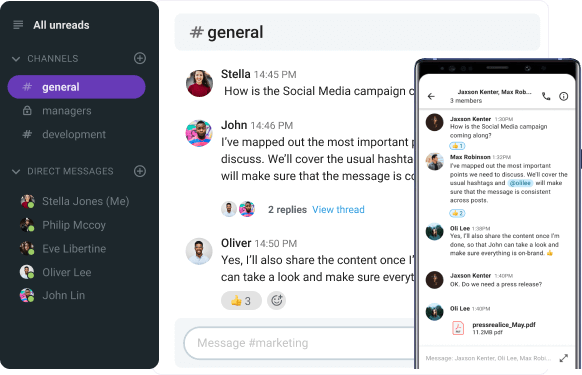Do you cringe when you receive a compliment?
Do you beat yourself up for days after an awkward response filled with self-deprecating humor?
Fear not — everyone has been unsure how to respond to a compliment at least once. Fortunately, we’re about to turn those “ums” and “uhs” into confident and professional “Thank yous” and “I appreciate that”!
In this blog post, we’ll cover:
- Tips on how to respond to compliments at work,
- Different ways to say “Thank you for the compliment” and
- The benefits of knowing how to respond to compliments humbly and professionally.
Let’s start.
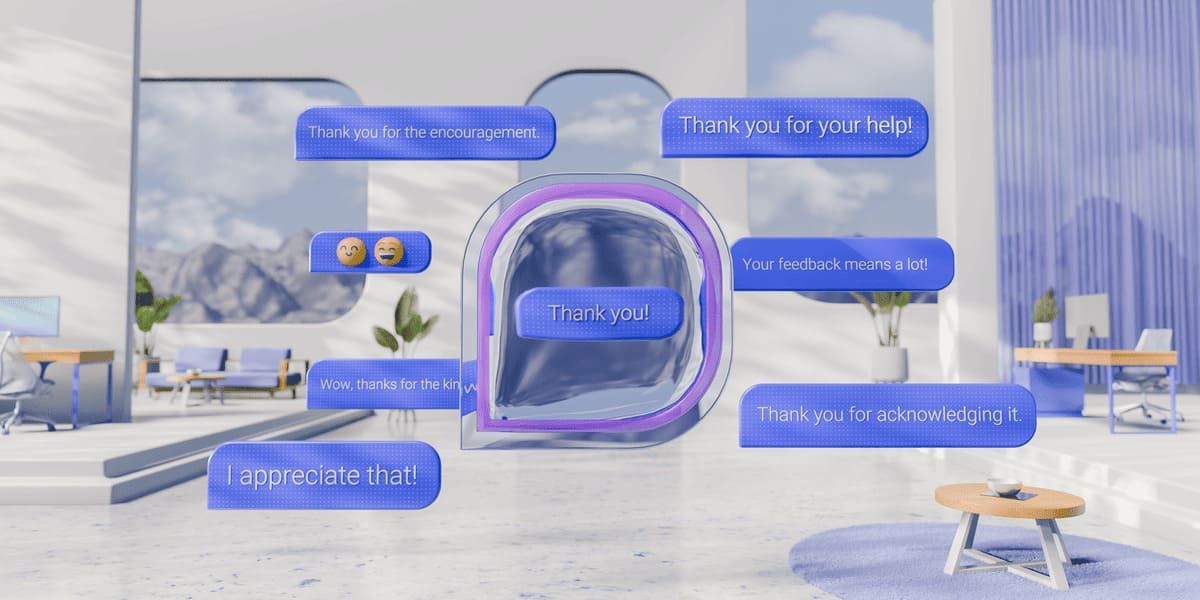
How to respond to a compliment at work
The best way to respond to a compliment at work is to keep it simple.
A genuine “Thank you for the compliment” or a humble “Thank you for acknowledging my work” is always a good option.
You can then express how much you appreciate the kind words, or you can return the compliment.
Here are a few general responses you can try:
“I appreciate the compliment. Thank you.”
“Thank you for appreciating my work. It means a lot.”
“Thank you for the recognition. I appreciate the feedback.”
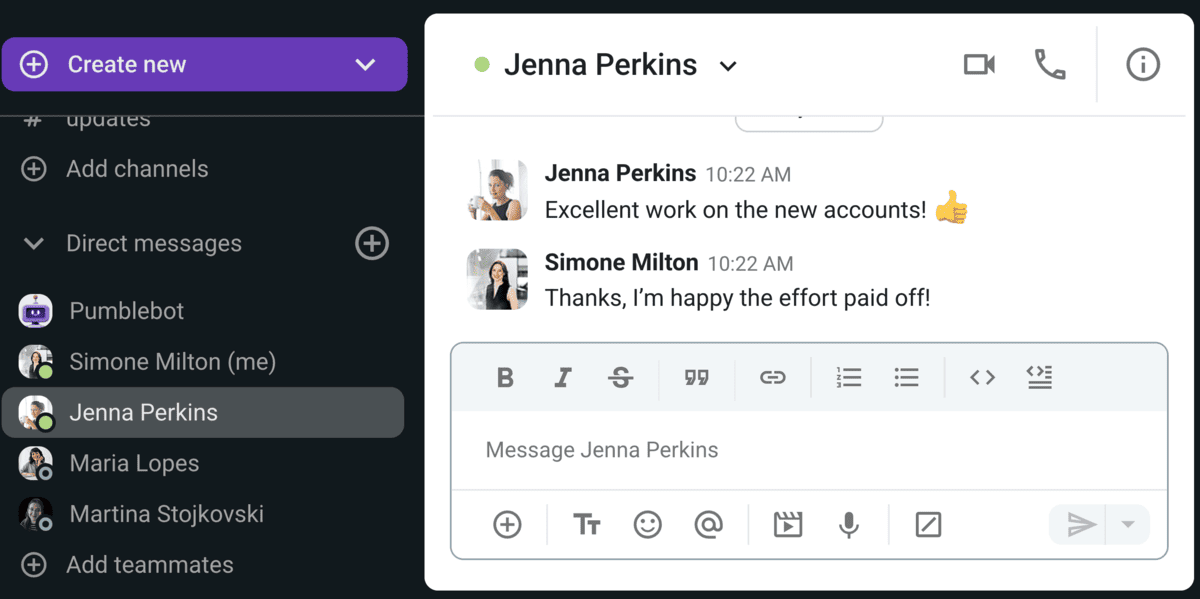
How you respond to compliments can impact your professional relationships and work environment. Hence, it’s important to handle them with grace and positivity.
Here’s what you should keep in mind when responding to a compliment:
- Express gratitude,
- Be genuine,
- Return the compliment (when appropriate),
- Stay humble,
- Practice in advance, and
- Don’t deflect or downplay.
We’ll now go over these tips in more detail.
#1: Express gratitude
The key to responding to a compliment is gratitude. It doesn’t have to be overly long or dramatic — a simple “thank you” or “I’m grateful for the opportunity” goes a long way.
To express sincere gratitude, maintain eye contact and offer a genuine “thank you.” Friendly body language, such as a warm smile, reinforces your honest feelings.
Saying “Thanks for the compliment” is more than polite. Your response acknowledges the compliment and helps establish positive working relationships. As a result, your colleagues will feel seen and heard and recognize you as a true team player.
💡 Pumble Pro Tip
If you need creative and alternative ways of saying “You’re welcome” in a professional setting, read our blog post:
Tip #2: Be genuine
The second most important part of responding to a compliment is being genuine. Your response will feel authentic if you avoid false modesty and self-depreciation. These can undermine your message and make you seem dishonest.
A Clinical Associate Professor specialized in Corporate Communication, Dr. Cassandra LeClair, shared her advice:

“Be gracious and thank the person in a genuine manner. This shows that you appreciate their kind words and that you are confident in your abilities.”
So, when you’re at a loss for what to reply when someone appreciates your work, be authentic.
An honest, heartfelt response demonstrates your professionalism and helps build genuine relationships with team members.
💡 Pumble Pro Tip
Being genuine and transparent is essential for a thriving company culture. Practicing direct communication will help you be more straightforward and get your ideas across clearly. To find out more about direct communication and how to use it in the workplace, read our blog post:
#3: Return the compliment
After you receive a compliment and express your gratitude, you should say a few appreciative words yourself.
Research has shown that people give fewer compliments than they’d like and underestimate the positive effects compliments have on others. Even though returning a compliment isn’t always possible, if you have something nice to say, go right ahead.
For example, imagine you’re working on a project, and your coworker compliments you on your hard work and dedication. It’s a great opportunity for you to return the compliment.
But, how do you reply to a compliment in the best way?
Here’s what that exchange could look like:
“I wanted to let you know that I value your hard work on this project. Your efforts have made a huge difference in our team. Well done!”
“Thank you for acknowledging my work. I appreciate it, and I must say, I’ve also been fascinated by your dedication to this project. You’ve been working really hard.”
Make your response sincere and relevant to the situation. You don’t want to do it just for the sake of returning a compliment — insincere flattery often backfires.
Exchange compliments with your teammates effortlessly over Pumble
#4: Stay humble
Although many people have a hard time receiving and responding to compliments, others genuinely enjoy it. If you’re one of those people, the entire exchange is likely a positive experience that brings you joy and boosts your confidence.
However, don’t let that confidence turn into arrogance. It’s essential to remain humble when responding to compliments — don’t take it as an opportunity to sing your own praises.
Dr. LeClair agrees that responding to compliments isn’t the time to brag about yourself:

“Don’t use the compliment as an opportunity to brag about yourself. Focus on the task or project that you were complimented on. You can say something like, ‘I’m proud of the work we did on that project,’ or ‘I’m glad that our team was able to achieve our goals’.”
Furthermore, if the success results from teamwork and group collaboration, give credit where credit is due.
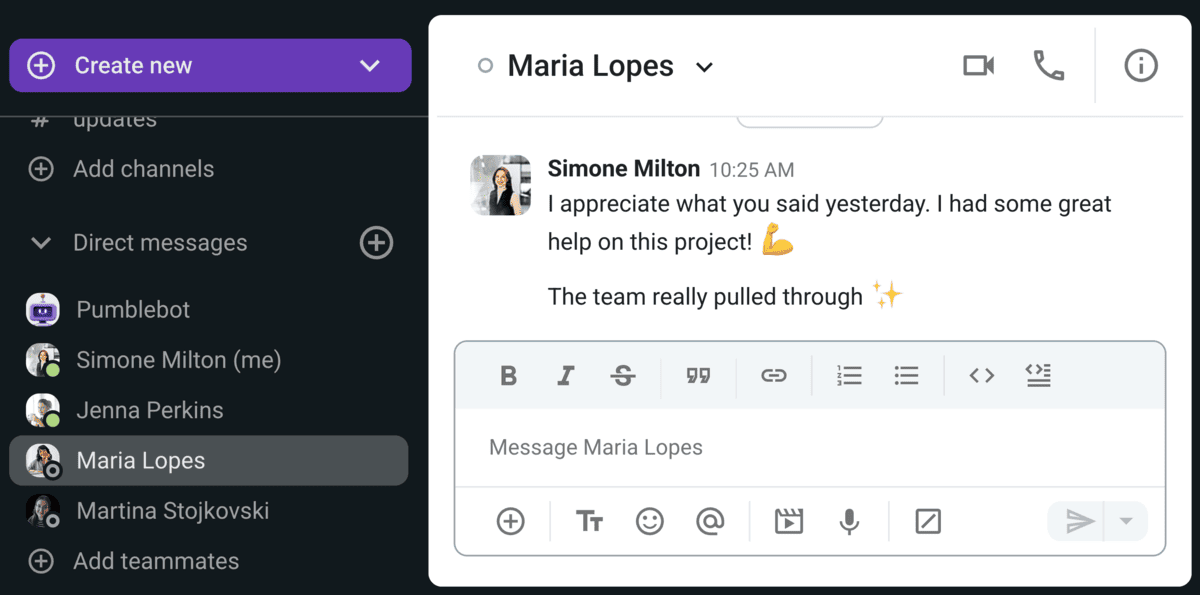
Dr. LeClair adds that praising your colleagues will show you’re a team player:

“Share the credit. If you received the compliment for teamwork, be sure to share the credit with your team members. This shows that you are a team player and that you value the contributions of others.”
Humility opens many doors in the workplace. So, stay humble, and don’t let the compliments get to your head.
#5: Practice your responses in advance
The trouble with knowing how to respond to a compliment?
Mustering up the confidence.
The good news is, you could practice in advance if you struggle with this.
Practicing your responses can help you with any anxiety or awkwardness you may feel when you receive a compliment.
For example, you’ll probably anticipate a few compliments if you go into the office with a fresh haircut. Consider how you’ll respond to the compliments to avoid feeling awkward or uncomfortable.
You can rehearse with a trusted friend who can provide constructive feedback to make you sound professional and natural.
Moreover, you can mentally prepare by thinking about various compliments and how you’d like to respond to them.
Dr. LeClair provides a valuable tip on how to stay composed in similar situations:

“If you feel uncomfortable receiving a compliment, it’s okay to take a moment to pause before responding to give you time to collect your thoughts and provide a more gracious response.”
When the moment arises and you receive a compliment, you’ll feel more confident and composed because you’ve practiced beforehand.
#6: Don’t deflect or downplay the compliment
If you’re reading this, you’ve likely struggled figuring out what to say when someone appreciates your work.
Many people deal with this uncomfortable feeling incorrectly — by deflecting or downplaying the compliment.
Perhaps it’s due to low self-esteem or not wanting to sound boastful and vain.We spoke to Bayu Prihandito, a Certified Psychology Expert, Life Coach, and Founder, who expands on this, adding that imposter syndrome can also be an issue:

“From my experience, I’ve noticed that people often struggle with compliments because of the underlying issue of self-worth or imposter syndrome. It’s important to understand that everyone, at some point in their career, feels like they don’t entirely belong. But remember, compliments are always given for a reason! They’re a reflection of your hard work, talent, or even just your ability to make someone’s day better. Accept them, learn from them, and let them be a source of motivation for further growth.”
Although the urge to deflect may be strong, do your best to resist it. Brushing off someone’s compliment will make them feel unheard and unappreciated.
Additionally, Dr. LeClair believes that deflecting compliments can make you seem insecure:

“Even if you don’t feel like you deserve the compliment, avoid deflecting the kind words. This can make you seem insecure or ungrateful. Instead, accept the compliment and express your appreciation.”
A nice reply to a compliment strikes a balance between humility and professionalism.
If you genuinely want to share credit or explain your success in more detail, you can do so without diminishing the compliment you received.
Examples of best responses to compliments at work
Now that you know how to receive compliments professionally, let’s see it in action.
We’ve prepared a range of examples, from formal replies to casual responses you can try with work friends. We’ve even added examples you can use to respond to a compliment from a boss or client!
Here they are.
How to respond to compliments in any work situation
First, we’ve compiled a list of responses to compliments you can use in various work situations. Some are short and simple, while others are more detailed.
Here are the examples.
“Thank you for the recognition. I really appreciate it.”
“Thank you for your kind words. It means a lot to me.”
“I’m pleased to hear you say that. I’ve been working really hard. Thank you for the compliment.”
“Thank you so much. Your positive feedback is very much appreciated.”
“I’m flattered by your words. Let’s keep up the good work together!”
“Thank you for the encouragement. Our hard work and dedication have paid off.”
“Thank you so much. It was truly a team effort.”
“Your feedback means a lot to me. Thank you.”
“I’m truly humbled. It’s a pleasure to be a part of the team.”
“It’s so motivating to hear such nice words. Thank you.”
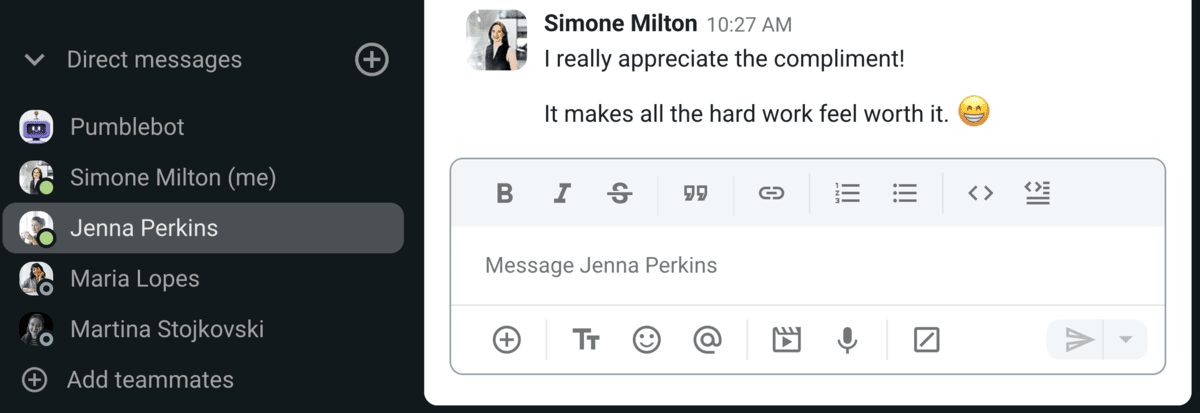
Humble responses to compliments
As we’ve discussed, humility is an important quality in the workplace.
If you prefer to respond to compliments with more modesty, here are some examples to get you started.
“Thank you for your kind words. I had a great team supporting me, and I’m grateful for the opportunity to work with them.”
“Thank you. It was a collective effort. I couldn’t have done it without my team.”
“Thank you for your feedback. I’ve learned a lot from the guidance of my team.”
“I appreciate your kind words. I’m fortunate to have a great team and a supportive work environment behind me.”
“Thank you. It’s a pleasure to work with a team that supports me and values collaboration.”
“I’m constantly trying to improve and contribute to the team’s success, so thank you for acknowledging my work.”
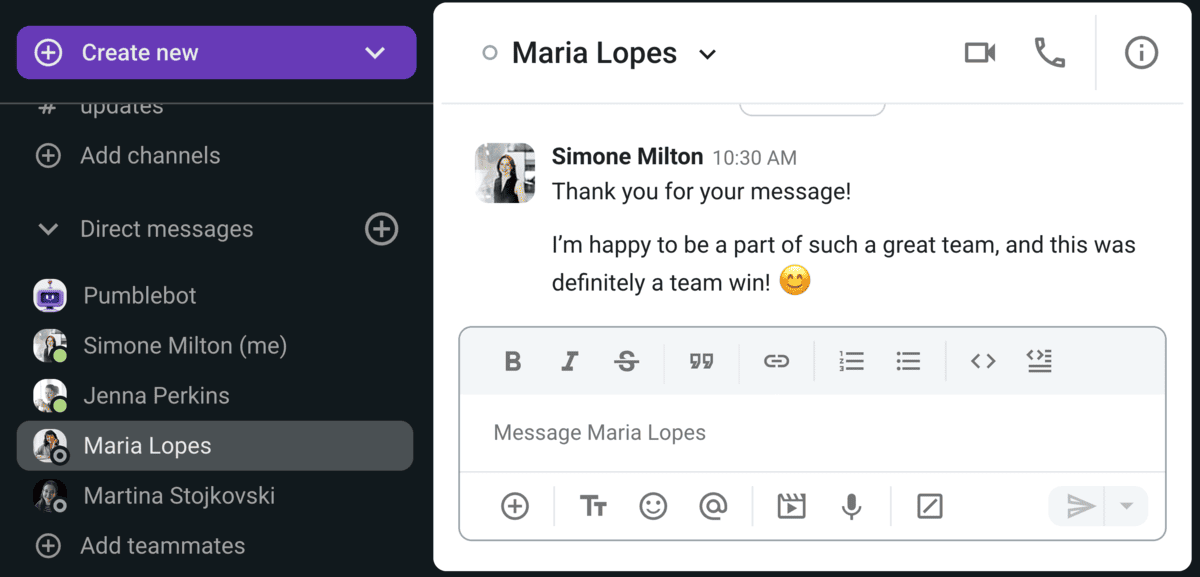
Professional responses to compliments
In some work environments, you have to remain professional at all times.
Although most examples we’ve prepared are suitable for business communication, here are a few examples if you want to take it up a notch.
“Thank you for your recognition. I’m committed to delivering high-quality work and continuing to contribute to our success.”
“I appreciate your words of encouragement. Our team’s hard work and dedication make achievements like this possible.”
“Thank you for your appreciation. I’m grateful for the opportunities I’ve received in this organization.”
“Your feedback is most appreciated. Let’s keep pushing for excellence.”
“It’s a privilege to be a part of a team that strives for excellence. Thank you.”
“I’m beyond grateful for your recognition. These results are a testament to the support I receive from my team.”

Make your workplace communication simple and professional with Pumble
Formal responses to compliments
If your workplace is more formal, you may need some ideas on how to respond to a compliment at work.
Here are a few helpful examples.
“I sincerely appreciate your words. These achievements wouldn’t have been possible without the collaborative effort of our team.”
“Your kind words are greatly appreciated. I’m committed to upholding this quality of work.”
“I appreciate your words of encouragement. Our shared vision of quality lays a strong foundation for my achievements.”
“Thank you for your appreciation. I’m fortunate to be surrounded by talented and diligent colleagues.”
“Your feedback is a great source of motivation. I will continue to do my best. Thank you for the compliment.”
💡 Pumble Pro Tip
Although many workplaces nowadays embrace more casual communication, formal communication is still a valuable skill. To learn more about formal communication and how to master it, read our blog post:
Informal responses to compliments
If you work in a relaxed environment or are friends with your colleagues, you might ditch formal communication in favor of a more casual approach.
Here are a few ideas on how to respond to compliments in an informal tone.
“Thanks! I owe it all to you guys.”
“I’m glad you think so. We make a great team.”
“Thank you. I appreciate the shoutout.”
“Thanks a lot. Couldn’t have done it without our amazing team.”
“Thanks for the compliment! It’s a joint effort, but I’m happy to be along for the ride.”
“Wow, thanks for the kind words. It means a lot.”
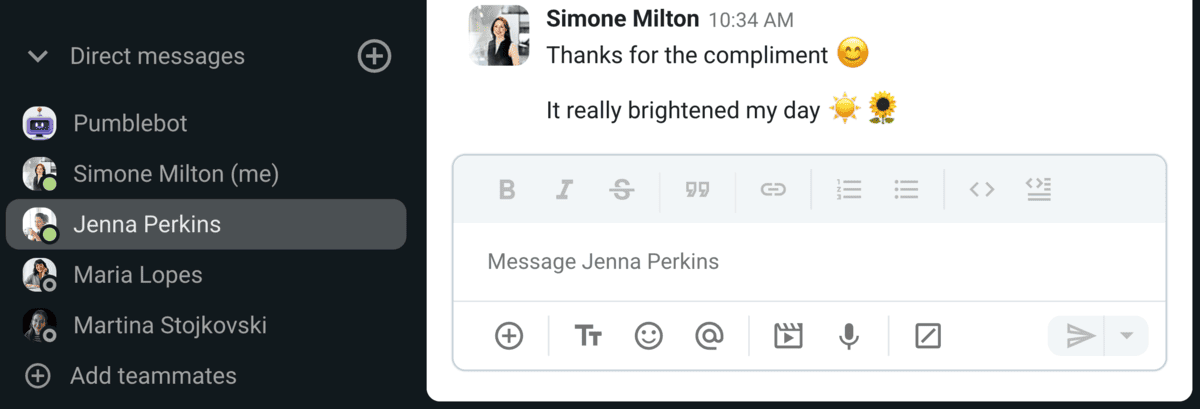
Nice responses to compliments
A nice reply to a compliment will make the other person feel just as good as you do, so let’s see a few examples.
“It’s always nice to hear positive feedback. Thank you for sharing.”
“That’s very kind of you to say. Thank you.”
“Your compliment made my day. Thank you so much.”
“It’s wonderful to hear that my work is appreciated. Thank you.”
“Thank you so much for taking the time to acknowledge my work. It truly means a lot.”
“Thank you for brightening my day with your kind words. I appreciate it.”
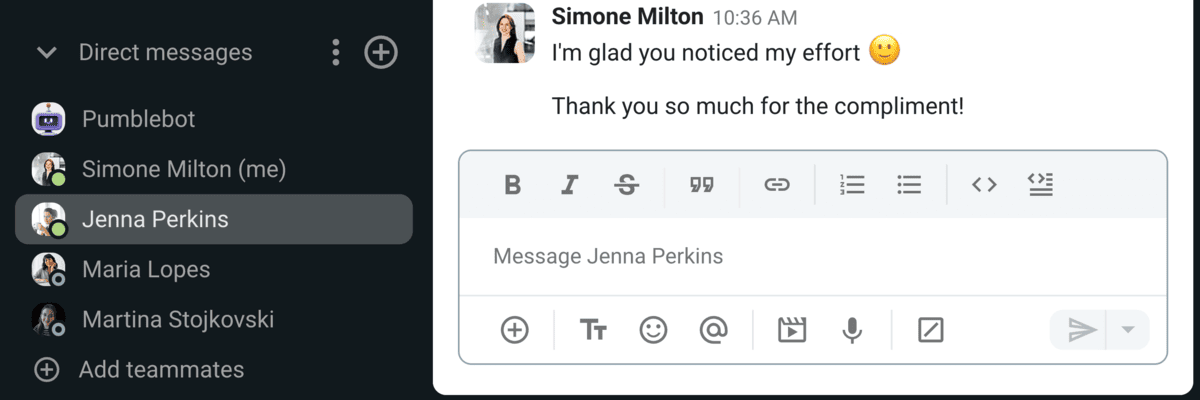
Responses to compliments from coworkers
If you receive a compliment from a fellow team member, it’s an excellent opportunity to bond.
Dr. LeClair explains further:

“If you’re receiving a compliment from a colleague, you can use the opportunity to build rapport and get to know them better. Ask them about their work or their interests and see where the conversation can go!”
Here’s how you can do that.
“Thank you. It’s a pleasure to work with you. Let’s chat during lunch.”
“I appreciate your feedback. Let’s keep up the good work together.”
“Thanks! I really appreciate your opinion. Feel free to share it more often.”
“I’m honored by your recognition. Your support has been greatly appreciated.”
“Our teamwork truly makes the dream work. Let’s keep it up.”
“Thank you for the compliment. This achievement is a testament to the fantastic work we do together.”
“Thank you so much for your help during this project. I would love to talk more over a cup of coffee tomorrow.”
💡 Pumble Pro Tip
Complimenting your coworker is a great way to start a conversation and build a strong connection. If you need more conversation starters, read our blog post:
Responses to compliments from your boss
If you get a compliment from your boss, why not take the chance to strengthen that relationship?
Here’s how you could respond.
“Thank you, I appreciate the compliment. Your guidance has been invaluable.”
“Thank you. It’s a pleasure to work under your leadership.”
“I appreciate the feedback. Your mentorship has been invaluable during this time.”
“Thank you. Your feedback is appreciated, and it motivates me to keep improving.”
“It’s a privilege to be guided by someone as experienced as you. Thank you.”
“Thanks! It’s motivating to hear feedback from you.”
“Thank you. It’s great to have a boss who appreciates and guides their team so well.”
Response to compliments from clients
Compliments from clients have a special meaning and importance. Not everyone hears back from clients, but some customer communication apps provide guest access, which allows you to invite external guests to your virtual workspace.
So, when you spot a compliment in your DMs, make sure to respond graciously and professionally to show your gratitude.
Here’s how you can do that.
“Thank you for your kind words. We value your business and appreciate the positive feedback.”
“I’m delighted to hear that you’re pleased with our service. Your satisfaction is our top priority.”
“Your words mean so much to us. We’re dedicated to providing the best possible service to our clients.”
“Thank you for your positive feedback. Your satisfaction is a testament to our team’s hard work and dedication.”
“Thank you. It’s been a pleasure to work with you, and we look forward to continuing our collaboration.”
“Your compliments motivate us to keep improving. Thank you.”
“Thank you for sharing your positive experiences with us. It motivates us to keep delivering excellent service to our customers.”
“Your satisfaction is our greatest reward. Thank you for trusting us with your business.”

The power of gratitude: Why is it important to learn how to respond to a compliment?
Research on prosocial behavior shows that people massively undervalue kindness and gratitude, underestimating how much happiness gratitude brings to others.
In fact, reciprocating kind words is a skill worth honing if you want to contribute to a positive work environment.
Our contributor, Dr. LeClair, sums up the benefits of knowing how to professionally respond to compliments:

“There are several reasons why it is important to learn how to professionally accept a compliment.
First, it shows that you are confident.
Second, it creates a positive work environment and builds relationships with your colleagues and manager.
Third, it can help you advance your career. When your manager sees that you are able to recognize your strengths and be gracious, they may be more likely to give you more responsibility and opportunities.”
In short, when you gracefully accept compliments, you acknowledge your strengths and demonstrate confidence in your abilities. This confidence reassures your team members, superiors, and clients, illustrating your competence and expertise.
Not to mention, confidence will make others more likely to trust and rely on you, opening up new opportunities for career development.
Respond to compliments quickly and easily over Pumble
Many of us working remote or hybrid environments have faced challenges when responding to compliments due to:
- Glitchy apps,
- Time zone differences, and
- Schedule conflicts caused by flexible work policies.
However, the most reliable team communication apps, such as Pumble, provide a handy solution.
No matter when a compliment comes in, you can respond to it on your own terms and in different ways.
For example, if someone sends you a compliment in your inbox, you can reply with a direct message or answer in threads. Thanks to custom emojis, you can also make your messages more personal.
Supervisors often give compliments in private or public channels, so again, you can use threads to respond and keep the conversation structured.
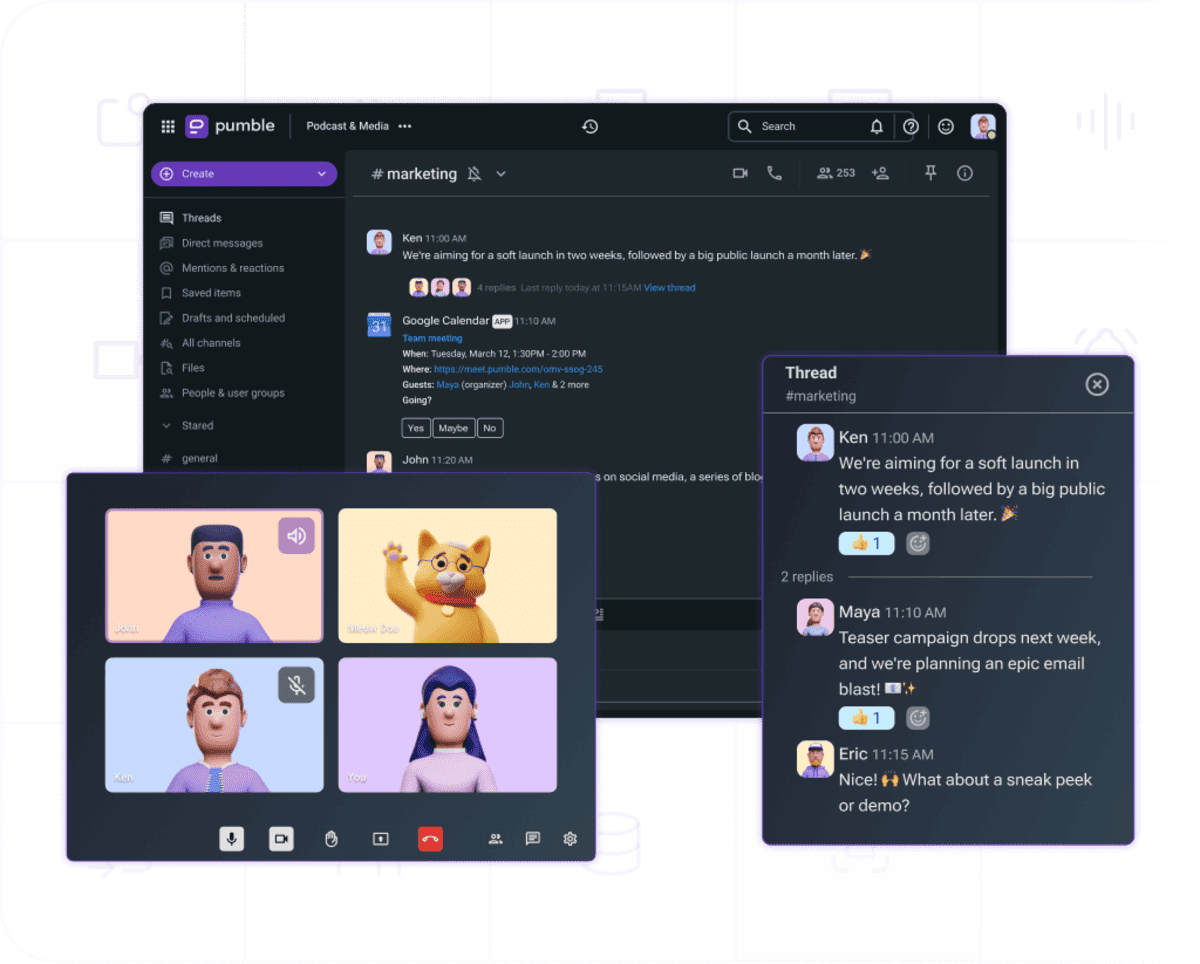
One of the biggest benefits of Pumble is that it fights the short-lived nature of compliments. When the dust settles, you can always revisit the compliments you’ve received, thanks to the app’s unlimited messaging history.
Finally, if you receive a huge compliment, promotion, or a bonus, you can ask your superiors to schedule a video or voice call so you can share your gratitude — the choice is yours!
Communication isn’t just about sending messages — it’s about forming lasting connections.



